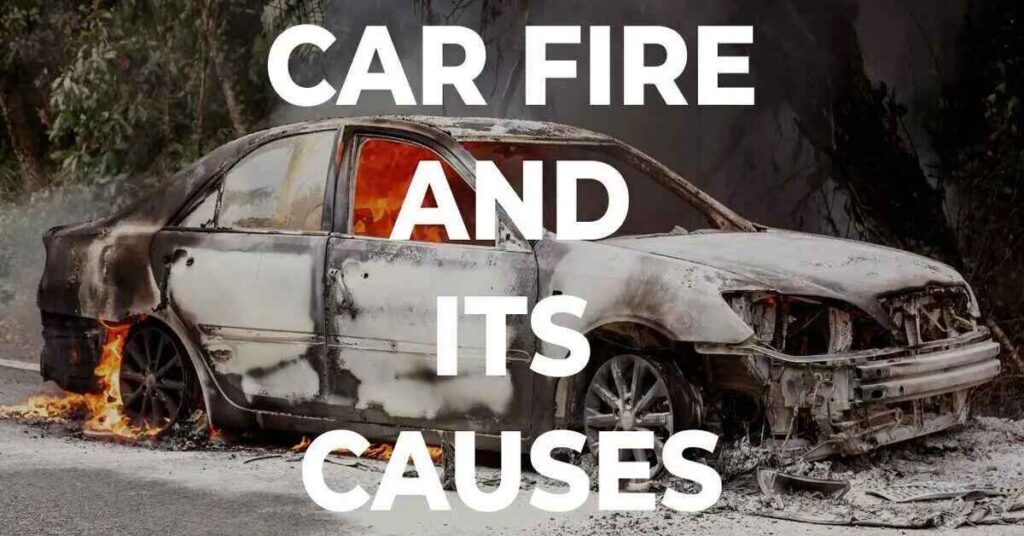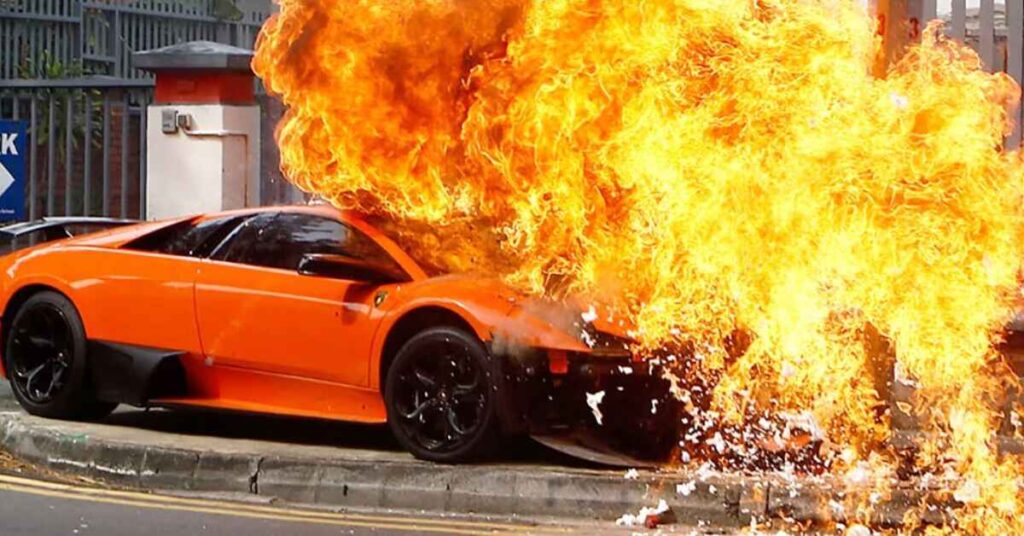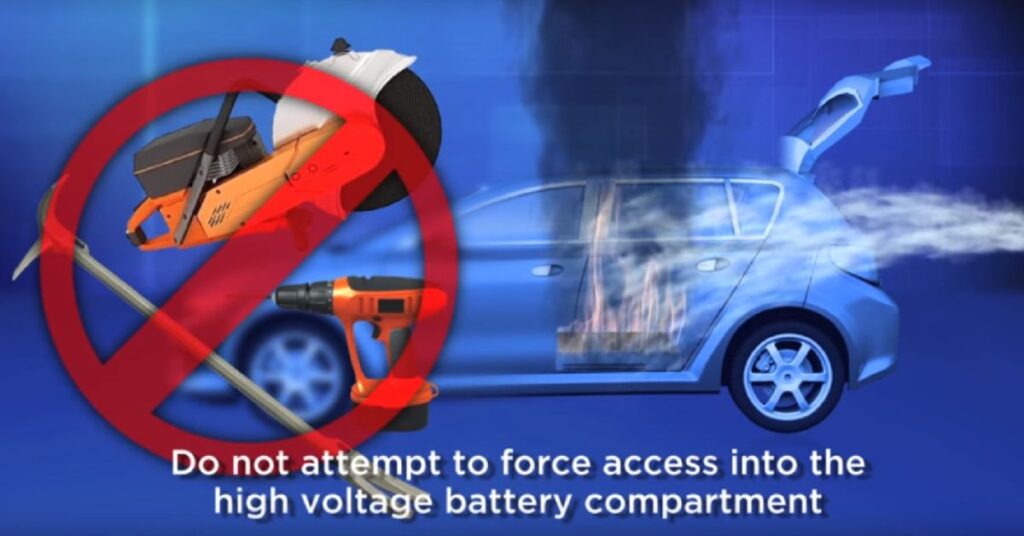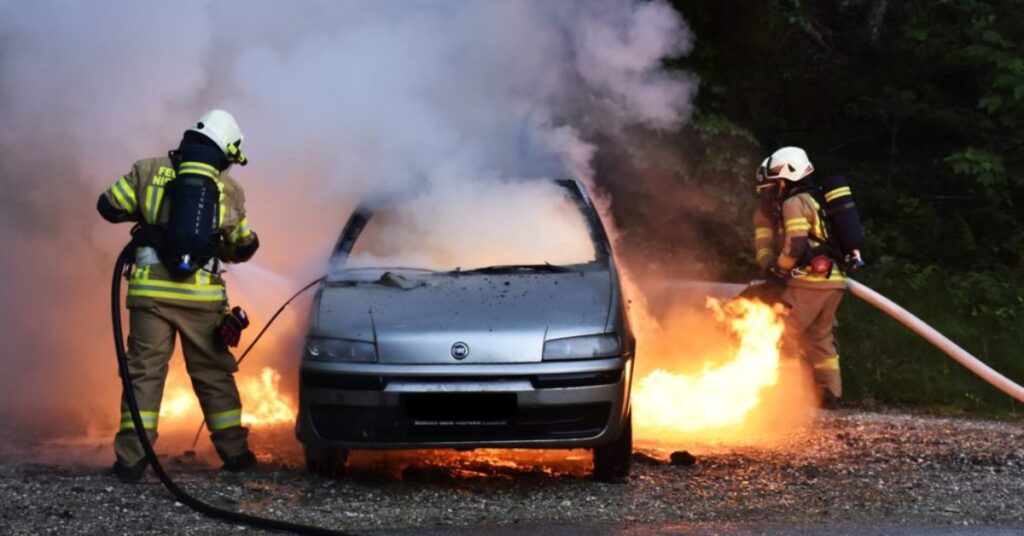Electrical fires in vehicles can be catastrophic, causing extensive damage and posing serious safety risks.
While car insurance aims to protect you from such unfortunate incidents, the coverage for electrical fires can be complex and varies among insurers.
This comprehensive guide will explore whether your car insurance policy covers electrical fires and what you need to know to ensure you’re adequately protected.
Understanding car insurance coverage for electrical fires is crucial, as these fires can cause extensive damage and pose serious safety risks.
Electrical fires can quickly spread and consume a vehicle, making them particularly dangerous and costly to repair or replace.
What Causes Electrical Fires in Cars?

Electrical fires in cars can originate from various sources, including:
- Faulty wiring or electrical components:
Over time, the wiring and electrical components in a vehicle can deteriorate or become damaged, increasing the risk of short circuits and electrical fires.
- Short circuits:
These occur when an electrical current deviates from its intended path, potentially causing sparks, overheating, and fire.
- Overloaded circuits or malfunctioning fuses:
When too many electrical components are drawing power from a single circuit, or if a fuse fails to function properly, it can lead to overheating and potentially ignite a fire.
- External factors:
Water damage, rodent damage, or other external factors can compromise the integrity of a vehicle’s electrical system, increasing the risk of electrical fires.
Here’s an example illustrating an electrical fire incident:
“John was driving his car when he noticed smoke billowing from under the dashboard. He quickly pulled over and discovered that a faulty wiring harness had caused an electrical fire, which quickly spread to the interior of the vehicle. By the time firefighters arrived, John’s car was completely engulfed in flames.”
Does Car Insurance Typically Cover Electrical Fires?
Most car insurance policies provide coverage for electrical fires under the comprehensive coverage portion of the policy.
Comprehensive coverage is designed to protect you from non-collision-related incidents, such as fire, theft, vandalism, and weather-related damage.
However, the extent of coverage for electrical fires can vary among insurers’ policies. Some insurers may have exclusions or limitations for electrical fires caused by wear and tear, negligence, or aftermarket modifications.
It’s essential to review your specific policy details and discuss coverage with your insurance provider to understand the scope of protection for electrical fires.
Read This Blog:
Factors Affecting Coverage for Electrical Fires
Several factors can influence whether your car insurance policy covers an electrical fire and the extent of coverage:
Age and condition of the vehicle:
Older vehicles with aging electrical systems may be more susceptible to electrical fires, and insurers may consider the vehicle’s age and condition when determining coverage.
Cause of the electrical fire:
If the fire was caused by a manufacturing defect or a recalled component, your insurance provider may seek reimbursement from the manufacturer. However, if the fire resulted from aftermarket modifications or improper installation, coverage may be limited or denied.
Timely reporting and documentation:
Promptly reporting the incident and providing thorough documentation, including photos and repair estimates, can strengthen your claim and facilitate the claims process.
Policy limits and deductibles:
Your policy’s coverage limits and the deductible amount you’re responsible for paying will impact the out-of-pocket costs associated with an electrical fire claim.
Filing a Claim for an Electrical Fire

If you experience an electrical fire in your vehicle, it’s essential to take the following steps:
Safety first:
If the fire is active, evacuate the vehicle immediately and call emergency services. Your safety and the safety of others should be the top priority.
Document the incident:
Once safe, take photos and videos of the damage to your vehicle, capturing the extent of the fire and any potential causes or contributing factors.
Notify your insurance provider:
Contact your insurance company as soon as possible to initiate the claims process. Provide them with detailed information about the incident, including the date, time, location, and any relevant documentation.
Cooperate with the investigation:
Your insurance provider may send an adjuster to inspect the vehicle and determine the cause of the fire. Cooperate fully and provide any requested information or documentation to support your claim.
Address potential challenges:
If your claim is initially denied or you encounter challenges during the process, don’t hesitate to escalate the matter or seek assistance from consumer protection agencies or legal counsel if necessary.
“The claims process can be daunting, but being prepared and proactive can make a significant difference,”
said Insurance Expert Sarah Johnson.
“Maintain thorough documentation and communicate openly with your insurer to increase the likelihood of a successful claim.”
Read More:
Do Electric Cars Have Catalytic Converters? A Comprehensive Guide
Preventive Measures to Reduce Electrical Fire Risks

While car insurance can provide financial protection in the event of an electrical fire, taking preventive measures can help reduce the risk and potentially avoid such incidents altogether:
Regular maintenance and inspections:
Follow the recommended maintenance schedule for your vehicle, including regular checks of the electrical system by a qualified mechanic.
Choose reputable repair shops and certified mechanics:
When repairs or modifications are needed, work with reputable shops and certified mechanics who understand the intricacies of your vehicle’s electrical system.
Avoid aftermarket electrical modifications:
Unless absolutely necessary and performed by a professional, avoid aftermarket electrical modifications that could compromise the integrity of your vehicle’s electrical system.
Install safety devices:
Consider installing additional safety devices, such as circuit breakers or fire extinguishers, to help mitigate the risks and potential damage from an electrical fire.
By taking these preventive measures, you can significantly reduce the likelihood of experiencing an electrical fire in your vehicle and the associated costs and risks.
Conclusion
While car insurance policies typically cover electrical fires under the comprehensive coverage portion, the extent of coverage can vary depending on factors such as the age and condition of the vehicle, the cause of the fire, and your specific policy details.
It’s crucial to review your policy, understand the exclusions and limitations, and take preventive measures to reduce the risk of electrical fires.
Remember, prompt reporting, thorough documentation, and open communication with your insurance provider can help ensure a smoother claims process in the event of an electrical fire.
By being proactive and taking necessary precautions, you can better protect yourself and your vehicle from the devastating effects of an electrical fire.
Frequently Asked Questions
Is a starter motor covered under insurance?
A starter motor may be covered under a comprehensive auto insurance policy if the damage is due to an accident or specified peril, but not for regular wear and tear.
What is covered in an engine protection cover?
An engine protection cover typically includes damages to the engine due to water ingression, leakage of lubricating oil, or damage to undercarriage components.
Does car insurance cover your own mistakes?
Yes, comprehensive car insurance can cover your own mistakes, such as accidental damage to your vehicle, but this varies by policy and may affect your premium.
How is insurance calculated?
Insurance is calculated based on factors such as the insured item’s value, risk level, coverage amount, deductible, and the insured’s personal details like age, health, and driving history.
What two factors affect the cost of insurance premiums?
The two primary factors affecting insurance premiums are the level of risk associated with the insured item or individual and the coverage amount selected.
Why is it so hard to get life insurance?
It can be hard to get life insurance due to factors like pre-existing health conditions, high-risk lifestyles or occupations, age, and inaccurate or incomplete information on the application.







